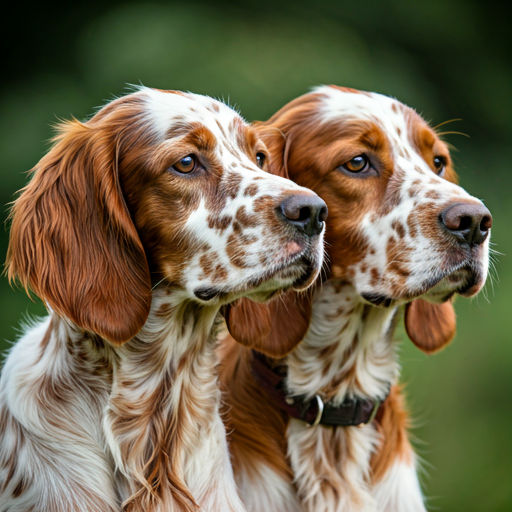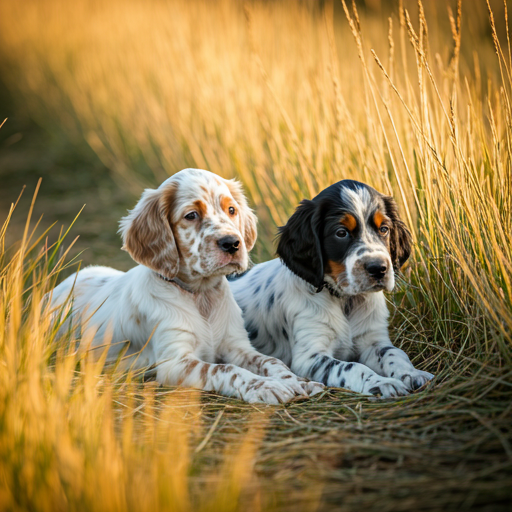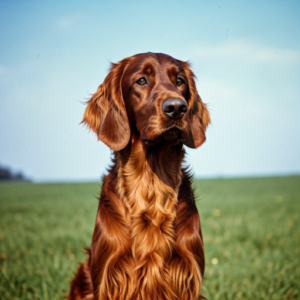Understanding the Llewellin Setter Breed
The Llewellin Setter, though often associated with the English Setter, stands out as a distinct breed, bred with a specialized purpose in mind. With a rich history dating back to the early 19th century, these dogs have earned their reputation as dedicated hunting companions. Unlike its ancestors, the more commonly recognized English Setter, the Llewellin Setter’s lineage is sometimes debated due to the complexity of its breeding history. While they share some characteristics with the English llewellin Setter puppies, Llewellin Setter puppies, including “how much does a Llewellin Setter cost,” possess certain traits that make them particularly suited to fieldwork.
Table of Contents
Often considered a cousin of the English Setter, Llewellins are known for their remarkable hunting instincts, particularly their ability to track and point birds. Their methodical, slow-paced approach through thick brush sets them apart from many other breeds, making them an excellent choice for upland bird hunters. While not formally recognized as a separate breed by the American Kennel Club (AKC), their distinct characteristics, including their robust stamina and hardworking nature, have earned them a loyal following among hunting enthusiasts.

Characteristics and Temperament
Llewellin Setters are known for their gentle yet driven demeanor. As an incredibly cooperative breed, they thrive when working alongside their human counterparts. They are highly methodical hunters, often taking their time to move carefully and deliberately through their environment, always on the lookout for potential game. This calm and patient nature extends beyond the field, making them excellent family companions.
Their affectionate disposition means they are just as likely to be curled up on the couch with kids and their owners as they are out in the field tracking birds. Llewellin Setters are known for their loving nature, and they bond deeply with their families, often seeking out affection and cuddles when not engaged in physical activity. They tend to get along well with children and other pets, making them an ideal choice for active families looking for a well-rounded companion.
Health and Care Considerations
While generally healthy, Llewellin Setters can be susceptible to a few hereditary conditions, the most common being Elbow and Hip dysplasia. These conditions, if left unchecked, can lead to mobility issues and discomfort. However, responsible breeding practices can significantly reduce the likelihood of these issues, so it’s essential to choose a breeder who prioritizes health above all else. Ensuring that both parents are free from these conditions can help guarantee protect the long-term health of the puppy.
Aside from these concerns, Llewellins are relatively robust and require a high level of physical activity. These show dogs tend to thrive on exercise and mental stimulation, and without it, they may become restless or even destructive. Regular grooming is also a must, as their long, silky coat and long hair can easily mat or tangle. Brushing several times a week will help keep long hair in their coat healthy, shiny, and free from mats.
Training and Socialization
Training a Llewellin Setter requires patience and consistency, as they respond best to calm, confident leadership. Despite their natural hunting instincts, they need a steady hand to help channel their energy and enthusiasm in a controlled manner. It’s important to remember that Llewellins litters are quick learners; they absorb information rapidly but can also become distracted if not given enough stimulation. Training sessions should always be kept engaging and positive to maintain their interest.
Early socialization is equally important for Llewellin Setters. Exposing them to a variety of people, animals, and environments will help them grow into well-rounded adults. Both males and females benefit from this process, as it teaches them how to interact appropriately with other dogs and people. A well-socialized Llewellin Setter is typically a calm, confident dog who adapts easily to new situations.
Great Hunting Dogs
Llewellin Setters are renowned for their exceptional hunting abilities, making them great hunting dogs. Their lineage is deeply rooted in the traditions of fieldwork, and they have been bred specifically for their prowess in tracking and pointing birds. This unique breed showcases a fine combination of agility, intelligence, and endurance, which are essential traits for successful hunting.
These dogs tend to excel in various hunting environments, from dense forests to open fields. Their methodical approach allows them to navigate through challenging terrains with ease, ensuring that they can locate and flush out game effectively. The Llewellin Setter’s keen sense of smell and sharp instincts make them invaluable companions for hunters who rely on their dogs to perform at and maintain a high level during hunts.
In addition to their hunting skills, Llewellin Setters are also known for their proven ability to work closely with their human partners. They are highly trainable and responsive, forming strong bonds with their owners, which further enhances their effectiveness in the field. Their cooperative nature means they are attentive to commands and can adapt to various hunting styles and techniques.
For those interested in hunting, owning a Llewellin Setter can be a rewarding experience. Their dedication and enthusiasm for the hunt make them not only great hunting dogs but also cherished companions who bring joy and excitement to every outing. Whether you’re an experienced hunter or a novice looking to explore the world of hunting, a Llewellin Setter can be the perfect match to help you achieve your goals.

The Cost of Llewellin Setter Puppies
When and how much does a llewellin setter puppies really cost when it comes to purchasing a Llewellin Setter puppy, the cost can vary widely depending on several factors. On average, you can expect to pay anywhere from $750 to over $2000 for a Llewellin Setter. Prices fluctuate based on the breeder’s reputation, the bloodline of the puppy, and the region where the dog is being sold. High-quality dogs with strong pedigrees, especially those bred for competitive events or field trials, tend to command higher prices.
In addition to the purchase price, prospective owners should also prepare for additional expenses. Veterinary costs, including vaccinations and initial check-ups, are essential for a healthy start in a puppy of life. Additionally, the cost of spaying or neutering a pup, along with basic supplies like food, bedding, and toys, should be factored into the overall expense. All these factors contribute to the financial commitment of owning a Llewellin Setter, but the rewards of having such a loyal and hardworking dog far outweigh the costs.
Factors Affecting Llewellin Setter Price
Several key factors influence the sale price of a Llewellin Setter puppy, and understanding these details can help you make an informed decision when purchasing. One of the most significant determinants is the breeder’s reputation. Experienced and reputable breeders who focus on producing healthy, well-socialized, llewellin setter puppies will typically charge more due to the care and resources invested in breeding.
The puppy’s bloodline is another important factor. Dogs with proven hunting or show pedigrees tend to be priced higher, as they are viewed as potential competitors in field trials or dog shows. The location of the sale and the breeder can also impact the price, as puppies sold in regions with a high demand for Llewellin Setters may be priced accordingly. Additionally, whether the puppy is considered pet-quality or show-quality can also affect its price. Show-quality dogs, which meet strict breed standards, are generally more expensive than those that are bred for companionship.
Finding a Reputable Breeder
Finding a reputable breeder is crucial when purchasing a Llewellin Setter. Start by looking for breeders who are registered with the Field Dog Stud Book (FDSB) or the American Kennel Club (AKC), as these organizations require breeders to adhere to strict breeding standards. Additionally, it’s a good idea to research the breeder’s reputation through reviews and testimonials from previous customers. This will provide insight into the quality of the dogs they produce and the level of care they provide to their animals.
A responsible breeder will provide a health guarantee for their puppies, ensuring that they are free from hereditary conditions like hip or elbow dysplasia. They should also have a clear breeding philosophy, emphasizing the importance of puppy health, temperament, and socialization. Beware of breeders who seem more focused on profit than the welfare of the puppy and the dogs. A transparent, ethical breeder will always be willing to answer your questions and provide information about details of the puppy’s lineage, health, and upbringing.
Ongoing Expenses and Responsibilities
Owning a Llewellin Setter involves several ongoing expenses. Beyond the initial purchase price, you’ll need to budget for regular veterinary care, including annual check-ups and vaccinations. Because of their active nature, Llewellins and dogs tend to require a significant amount of exercise, which may mean additional costs for activities such as dog sports, training, or memberships at dog parks.
Regular grooming is essential to keep your Llewellin Setter looking their best, and this can also involve financial investment. As with any active dog, it’s important to provide mental stimulation through training or puzzle toys to keep them sharp. All of these ongoing costs should be considered before making the decision to bring a Llewellin Setter into your own pet your own life or home.

Is a Llewellin Setter Right for You?
Llewellin Setters are a unique breed that requires a specific type of owner. They are best suited for active families or individuals who enjoy outdoor activities like hiking, running, or hunting. Their high energy level means they are not ideal for apartment living, where space and opportunities for exercise and outdoor activities may be limited. Additionally, their affectionate nature means they thrive in homes where they receive plenty of attention and love.
Owning a Llewellin Setter requires a commitment to training, grooming, and physical activity. These dogs are happiest when they are engaged in meaningful work or play, so potential owners should be prepared to provide a stimulating environment. If you can meet these needs, a Llewellin Setter can become an incredibly rewarding and loyal companion.












